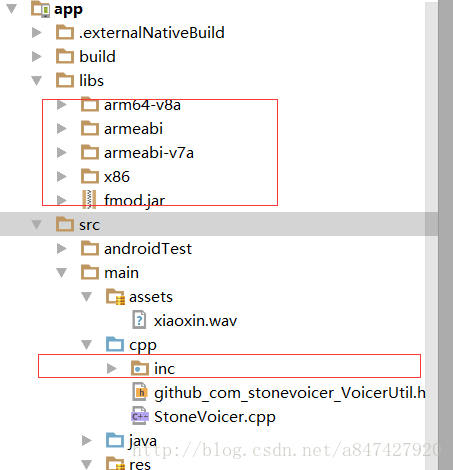仿QQ语言变声功能
仿QQ语言变声功能
这次写的是QQ语言变声功能,这个功能想必大家都使用过,那么这个功能是怎么实现的呢?
在开发中一边触及和语音,视频,算法等等都和c/c++相关,我们这里也是使用的NDK,链接第三方动态库,生成我们自己的库文件。
先来讲讲第三方的动态库,我们这里使用的FMOD音频引擎提供给android的api和动态库。我们可以到官网下载:
FMOD,因为下载需要注册,但是我天朝的。。。,需要vnp,所以这边也提供了下载地址:FMOD android下的开发
想看下效果图:
我么进入正题:
1.从fmod开发包中,引入动态库和jar包,头文件
2.编写CMakeLists.txt文件
cmake_minimum_required(VERSION 3.4.1)
set(distribution_dir ../../../../libs )
find_library( log-lib
log )
add_library( fmod
SHARED
IMPORTED )
set_target_properties( fmod
PROPERTIES IMPORTED_LOCATION
${distribution_dir}/${ANDROID_ABI}/libfmod.so)
add_library( fmodL
SHARED
IMPORTED )
set_target_properties( fmodL
PROPERTIES IMPORTED_LOCATION
${distribution_dir}/${ANDROID_ABI}/libfmodL.so)
set(CMAKE_CXX_FLAGS "${CMAKE_CXX_FLAGS} -std=gnu++11")
add_library( stonevoicer
SHARED
src/main/cpp/StoneVoicer.cpp )
include_directories(src/main/cpp/inc)
target_link_libraries( stonevoicer
fmod
fmodL
${log-lib} )
3.build.gradle中添加配置信息
ndk{
abiFilters "armeabi","x86","armeabi-v7a","arm64-v8a"
}
sourceSets {
main {
jniLibs.srcDirs = ['libs']
}
}
4.编写java代码
MainActivity:
public class MainActivity extends AppCompatActivity {
@Override
protected void onCreate(Bundle savedInstanceState) {
super.onCreate(savedInstanceState);
setContentView(R.layout.activity_main);
requestPermission();
FMOD.init(this);
}
private void requestPermission(){
if(ContextCompat.checkSelfPermission(this, Manifest.permission.WRITE_EXTERNAL_STORAGE)!= PackageManager.PERMISSION_GRANTED) {
ActivityCompat.requestPermissions(this, new String[]{Manifest.permission.WRITE_EXTERNAL_STORAGE}, 100);
}
if(ContextCompat.checkSelfPermission(this,Manifest.permission.RECORD_AUDIO)!= PackageManager.PERMISSION_GRANTED) {
ActivityCompat.requestPermissions(this, new String[]{Manifest.permission.RECORD_AUDIO}, 200);
}
}
public void mFix(View v) {
//音频路径可以去获取麦克风的数据,我这里写死了
String path = "file:///android_asset/xiaoxin.wav";
switch (v.getId()) {
case R.id.btn_normal:
VoicerUtil.fix(path, VoicerUtil.MODE_NORMAL);
break;
case R.id.btn_luoli:
VoicerUtil.fix(path, VoicerUtil.MODE_LUOLI);
break;
case R.id.btn_dashu:
VoicerUtil.fix(path, VoicerUtil.MODE_DASHU);
break;
case R.id.btn_jingsong:
VoicerUtil.fix(path, VoicerUtil.MODE_JINGSONG);
break;
case R.id.btn_gaoguai:
VoicerUtil.fix(path, VoicerUtil.MODE_GAOGUAI);
break;
case R.id.btn_kongling:
VoicerUtil.fix(path, VoicerUtil.MODE_KONGLING);
break;
default:
break;
}
}
@Override
protected void onDestroy() {
super.onDestroy();
FMOD.close();
}
}
VoicerUtil:
public class VoicerUtil {
public static final int MODE_NORMAL=0;
public static final int MODE_LUOLI=1;
public static final int MODE_DASHU=2;
public static final int MODE_JINGSONG=3;
public static final int MODE_GAOGUAI=4;
public static final int MODE_KONGLING=5;
/**
*
* @param path
* @param type
*/
public native static void fix(String path,int type);
static{
System.loadLibrary("fmod");
System.loadLibrary("fmodL");
System.loadLibrary("stonevoicer");
}
}
5.生成头文件
我这边使用的是javah来生成的:
javah -classpath . -jni github.com.stonevoicer.VoicerUtil
然后将头文件移动到cpp文件夹下:
6.编写c++代码
#include
#include
#include
#include "github_com_stonevoicer_VoicerUtil.h"
#include
#include
#include
#define LOGI(FORMAT,...) __android_log_print(ANDROID_LOG_INFO,"zph",FORMAT,##__VA_ARGS__);
#define LOGE(FORMAT,...) __android_log_print(ANDROID_LOG_ERROR,"zph",FORMAT,##__VA_ARGS__);
#define MODE_NORMAL 0
#define MODE_LUOLI 1
#define MODE_DASHU 2
#define MODE_JINGSONG 3
#define MODE_GAOGUAI 4
#define MODE_KONGLING 5
using namespace FMOD;
JNIEXPORT void JNICALL Java_github_com_stonevoicer_VoicerUtil_fix
(JNIEnv *env, jclass jcls, jstring path_jstr, jint mode){
LOGI("%s", "===>start");
System * system;
Sound *sound;
DSP *dsp;
Channel *channel;
float frequency;
bool isplaying= true;
System_Create(&system);
system->init(32,FMOD_INIT_NORMAL,NULL);
const char* path_cstr = env->GetStringUTFChars(path_jstr,NULL);
try {
system->createSound(path_cstr,FMOD_DEFAULT,NULL,&sound);
switch (mode){
case MODE_NORMAL:
LOGI("%s", path_cstr);
system->playSound(sound, 0, false, &channel);
LOGI("%s", "fix normal");
break;
case MODE_LUOLI:
//dsp->音效
//dsp 提升或者降低音调的一种音效
system->createDSPByType(FMOD_DSP_TYPE_PITCHSHIFT, &dsp);
dsp->setParameterFloat(FMOD_DSP_PITCHSHIFT_PITCH,8.0);
system->playSound(sound, 0, false, &channel);
channel->addDSP(0, dsp);
break;
case MODE_DASHU:
system->createDSPByType(FMOD_DSP_TYPE_PITCHSHIFT, &dsp);
dsp->setParameterFloat(FMOD_DSP_PITCHSHIFT_PITCH,0.8);
system->playSound(sound, 0, false, &channel);
channel->addDSP(0, dsp);
break;
case MODE_JINGSONG:
system->createDSPByType(FMOD_DSP_TYPE_TREMOLO, &dsp);
dsp->setParameterFloat(FMOD_DSP_TREMOLO_SKEW, 5);
system->playSound(sound, 0, false, &channel);
channel->addDSP(0, dsp);
break;
case MODE_GAOGUAI:
//提高说话的速度
system->playSound(sound, 0, false, &channel);
channel->getFrequency(&frequency);
frequency = frequency * 2;
channel->setFrequency(frequency);
break;
case MODE_KONGLING:
//空灵
system->createDSPByType(FMOD_DSP_TYPE_ECHO, &dsp);
dsp->setParameterFloat(FMOD_DSP_ECHO_DELAY, 300);
dsp->setParameterFloat(FMOD_DSP_ECHO_FEEDBACK, 20);
system->playSound(sound, 0, false, &channel);
channel->addDSP(0, dsp);
break;
}
}catch (...){
LOGE("%s", "发生异常");
goto end;
}
system->update();
while (isplaying){
channel->isPlaying(&isplaying);
usleep(1000 * 1000);
}
goto end;
end:
env->ReleaseStringUTFChars(path_jstr, path_cstr);
sound->release();
system->close();
system->release();
}
下面给出项目地址:StoneVoicer-Demo


